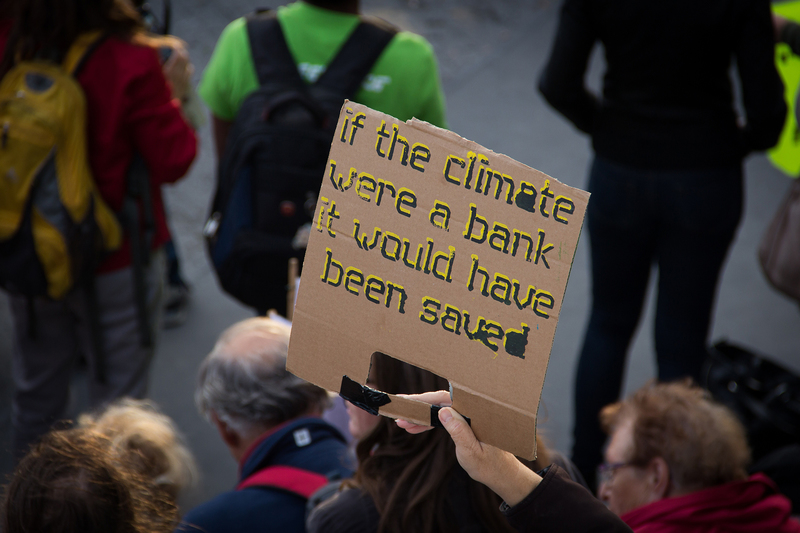Investors still not walking the talk
17 January 2020 | Story Cecile Feront and Stephanie Bertels. Photo Pxhere. Read time 10 min.
With the recent flood of pledges by investors to “turn up the heat” on climate action, one might think that the investment industry was in the midst of a profound shift. If only that were the case.
Officially, the majority of the world’s institutional investors, with assets under management worth more than US$89 trillion, subscribe to the Principles for Responsible Investment. In doing so, these companies have agreed to integrate environmental, social and governance factors into their investment processes.
Yet, so far, investors’ commitment to responsible investment appears to have exerted little influence on corporate behaviour and short-term investment trends. The funding of the fossil fuel industry continues to rise. Investment giants like BlackRock and Vanguard keep on voting against key climate resolutions. Major shareholders ignore the growth of social inequalities.
But our study, which tracks implementation from 2013 to 2019, found that the changes to investment practices were mostly superficial.
Even the PRI (the organisation that governs the Principles for Responsible Investment) acknowledges that action lags behind awareness. Companies are often not accounting for risks to sustainability. Nor do they account for how they are addressing environmental, social and governance issues relating to climate change.
Civil society organisations, academics and journalists have begun questioning whether responsible investment can bring about the level and pace of change required to enable an inclusive climate change transition. They are also highlighting the high risk of greenwashing – when companies set ambitious climate goals but have no plans for how to get there.
To better understand whether the financial industry is really shifting, we looked to South Africa, a country with a leading regulatory framework for responsible investment. Since 2011, all pension funds have been required to take a responsible investment approach as part of their fiduciary duty. A Code for Responsible Investment in South Africa) was released and in 2013 it supplied practice recommendations for institutional investors and their service providers. As a result, most South African institutional investors publicly pledged their support for responsible investment.
But our study, which tracks implementation from 2013 to 2019, found that the changes to investment practices were mostly superficial.
More talk than action
We looked at what South African institutional investors said they were doing on their websites or in their financial and other reports. The changes focused on publishing annual general meeting voting results and creating policies to increase transparency. Sustainability policies were generally rudimentary, using tailor-made definitions. They did not depart from “business as usual”.
And when we spoke to industry insiders, we found that even among responsible investment leaders, core investment practices and incentive structures remain largely unchanged.
Portfolio managers talked about environmental, social and governance factors being an irritation. They said these often came at the wrong time in the investment process. Others explained that environmental or social data were still seen as “fluffy” and difficult to factor into investment decisions.
Our findings are backed up by a recent report concluding that South African investors might be aware of these issues in theory, “but may not understand what it means in practice”.
Is ambiguity causing the implementation gap?
We believe that part of the problem may lie in the way the concept of responsible investment was introduced. How a concept is initially framed guides how it will be interpreted and implemented. The initial framing defines the core problem and attributes responsibility. It also articulates potential solutions and motivates action.
Portfolio managers talked about environmental, social and governance factors being an irritation.
In an effort to bring companies on board, the principles for responsible investment were initially framed using language that was flexible and compatible with investors’ priorities around risk and returns. At the same time, the language sought to accommodate society’s environmental and social concerns. For instance, in their declarations, PRI signatories recognise that “environmental, social, and corporate governance issues can affect the performance of investment portfolios”. Considering them “may better align investors with broader objectives of society”.
This early framing shifted the problem from the need to address environmental and social issues into a duty to consider how such factors might affect risks and returns. It failed to attribute any responsibility and it overly emphasised disclosure as a solution. As a result, investors’ obligation to review their practices was left open to interpretation.
While this framing boosted early adoption, it may have done so at the expense of effective change in the long term. The ambiguity of the language attracted investors to sign up to the principles. But it also allowed them to interpret the principles in a manner consistent with how they had always done business. They weren’t forced to review and change their practices and priorities.
By appearing to acknowledge societal demands for change, the framing of responsible investment seems to have inadvertently conveyed a false impression of progress. When we spoke with civil society organisations, they lamented how seeing their language reflected in the early framing may have delayed their efforts to hold investors to account.
The need to reframe responsible investment
As emissions and inequality continue to rise, responsible investment needs a reframing. The new frame needs to be clear on the core problem. It must attribute responsibility, motivate action and outline solutions. The focus needs to be squarely on reducing inequality and achieving an inclusive climate transition. If investors want to understand what society demands of them, they need only look to the Sustainable Development Goals. But investors will also need to be held to account. The framing of responsible investment must clearly express the depth and pace of change required in the investment industry. Initiatives like the Task Force on Climate-related Financial Disclosures are starting to guide the way.
As emphasised during the 2019 UN climate action summit and the discussions from COP25, the next 10 years are crucial to avoid irreversible change to the climate system and the furthering of social inequality that will accompany it. Investors must play a critical role in enabling the transformation that is urgently needed.![]()
Cecile Feront, PhD candidate, Graduate School of Business, University of Cape Town and Stephanie Bertels, Associate Professor, Beedie School of Business, Simon Fraser University.
Research & innovation





































